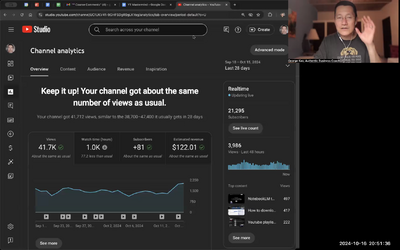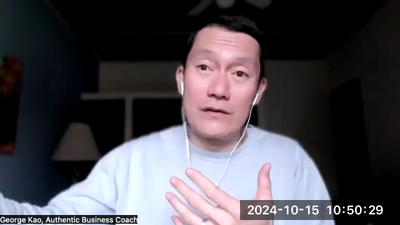- Orientation
- BizPlan
- BizPlan25
- Authentic Speaking
- Authentic Market Discovery
- Create Aligned Offers
- Joyful Productivity (Course)
- ✨ Authentic Outreach (AO)
- Joyful Pro
- Blog-to-Book
- 🚀 Course Creators
- 🖼️ Your Signature Framework
- 🙋 Effortless Yes
- 🌈 Energy Signature
- Meta Ads (FB / IG Advertising)
- 📱 Instagram Mastery
- 🎤️ Interview Mastery
- Launch Your Group Program
- Netcaring
- 🦸🏽✍🏽 Soulful Content (OGI)
- Substack Course
- "What do you do?"
- 🎬 YouTube Mastery
 2:45
2:45
How to be found on YouTube? Use the "Inspiration" tab and make videos on topics people are looking for...
For much more, check out the YouTube Mastery course.
 2:14
2:14
Building credibility even as we tell vulnerable stories
A few years ago I talked with Masterheart member Eric Klein about how we can develop credibility authentically and he wrote these helpful notes: One: When wanting to use self-as-example in talking about “vulnerable” experiences like sense-of-credibility etc etc I find it useful to remember a true/example from my childhood. Using childhood stories is powerful because: You (as the teller) are not (as) identified with that event/age and so can have a sense of care/carefree-ness in the telling. You can have both empathy for your younger self and a loving sense of humor (which makes the audience relax, too). They (as listeners) can project their emotions into the story because it’s more of a metaphor than a “real life” adult-business-example of doing social media marketing (which may already be overwhelming to hear about). The part of them that is fearful/doubtful/reactive resides at an earlier age/stage - like the “you” in the story. So, there's a natural (though unconscious) connection. Two: The focus/reframe on shifting from "feeling credible" towards "cultivating/enjoying connection" is beautiful and it includes (at least) two dimensions: Connecting with the audience: Specifically their aspirations, needs, “problems”, and innate wisdom/spirit. Connecting with yourself: Specifically your aspirations, needs, “problems”, and innate wisdom/spirit. Combining these, we can curate the right focus, information, empathy, and stories. Three: Our sense of credibility is built on: Loving our subject. Caring for our audience. Caring for the parts in us that are feeling less-than-fully-credible. Making lots of videos while doing the above. Responding to the feedback/questions we get as key source of new material (which allows us to recycle through each of these bullet points).
- Summarize this thread
- Copy link
I love these notes, thank you. Helpful.
Piggybacking and amplifying here: Another key piece is the "why" of the story: remembering that the telling of the story is not about/for us, that's not why we're sharing it. Instead we are sharing it to make a point. And also maybe convey that we are human, don't have it all figured out and/or need to look perfect.
- Summarize this thread
- Copy link
@Claire Magdalena Sierra Love it! Great wisdom, Claire! Thanks so much for sharing this!




Super helpful! Thanks for sharing this, George!